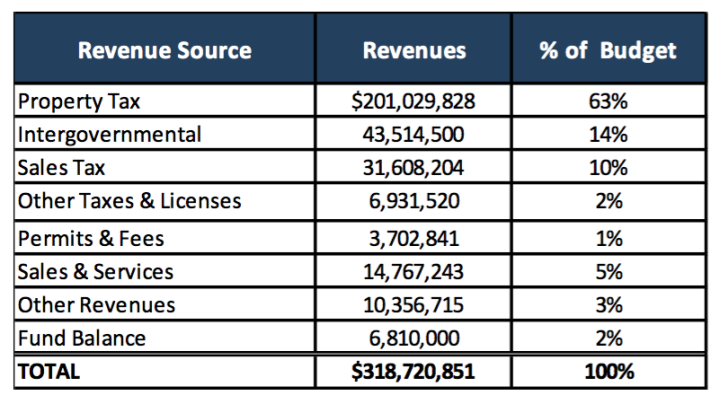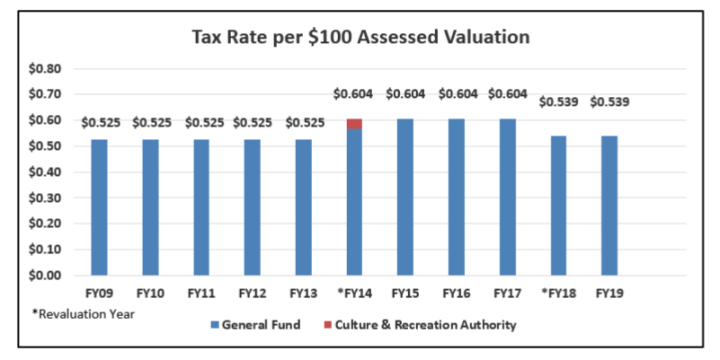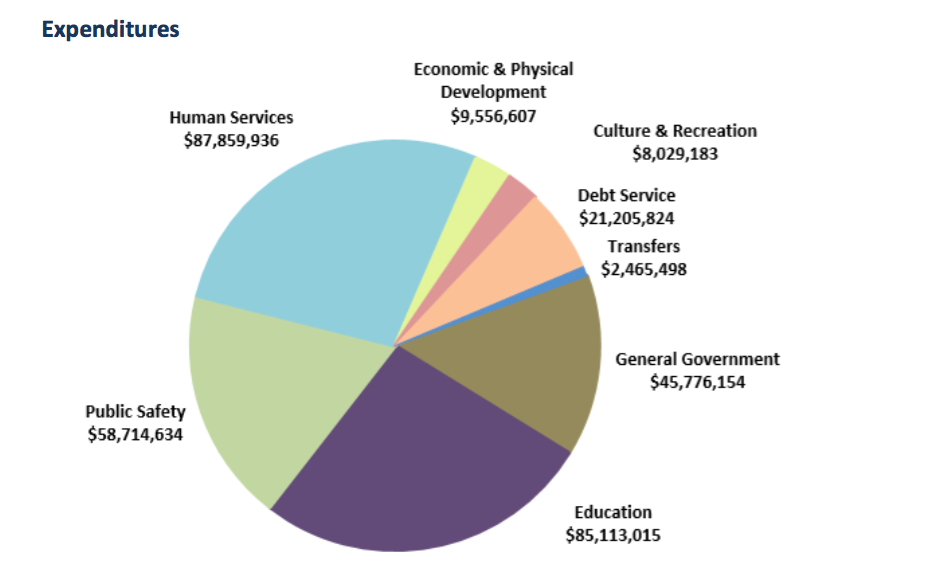Tuesday, May 15 will mark the first opportunity for citizens to hear about Buncombe County’s proposed budget for FY 2019.
The county’s proposed general fund budget for next year is $318,720,851, which marks a 3.6 percent ($12,014,537) decrease over last year’s budget, according to a summary document from County Manager Mandy Stone. The general fund fuels many of the county’s operating expenses, including general government, public safety, economic development, human services and education. The proposed budget also includes $107,849,894 in spending outside the general fund.
Stone said a change in the state child care subsidy policy shifted $8 million in direct assistance payments that previously flowed through the county to state administration, producing a corresponding decrease in county expenditures.
The proposed general fund budget maintains the current property tax rate of 53.9 cents. The county had initially considered decreasing the tax rate by one cent but changed course after hearing funding requests from Buncombe County Schools, Asheville City Schools and A-B Tech.
Funding for schools
The proposed budget includes a $3.4 million increase in funding for education, compared to the $4 million increase requested by Asheville City Schools, Buncombe County Schools and A-B Tech during a budget work session on May 8.

In the 2017-18 fiscal year, the Buncombe County School system received 64 percent of its funding from the state and 30 percent from local government.
Between fiscal year 2013 and fiscal year 2017, local government has increased its funding for the Buncombe County School system by 31 percent. Statewide, local government funding for schools has only increased by nine percent on average.
Over that same period, Buncombe County School’s state funding increased by 10 percent, while federal funding dropped by 32 percent.
“When you look at the state numbers and federal numbers, it’s a darn good thing that you do support us,” Tony Baldwin, the superintendent of the Buncombe County School system, told commissioners on May 8. “As a veteran administrator, I see that trend continuing. I think the dependence upon local funding will continue in this state.”
Local funding is also a fundamental part of the budget for the Asheville City School system. Administrators expect that 81 percent of the system’s 2018-19 budget will come from Buncombe County and the city of Asheville, with Buncombe County picking up the larger portion of the tab. City property owners pay a supplemental city schools tax in addition to their other city and county taxes.

The increased funding requested by the three school systems would help pay for state salary and benefit adjustments, textbooks, utilities, new staff positions to address behavioral health and programs designed to bolster the graduation rate.
Taxing questions
Still in flux is whether the commissioners will approve increased tax rates for 12 out of the county’s 20 fire departments. If approved without change, the tax rate increases would amount to a total of $2.7 million in extra spending by the county.
County fire chiefs made the funding request during the work session on May 8. Several said they were requesting increases because they were losing fire fighters to departments that offer better pay. Departments also hope to secure more money for infrastructure and updated vehicles.
The FY2018-19 requests are as follows:
- Barnardsville: $0.16/$100 to $0.20/$100
- Broad River: $0.14/$100 to $0.16/$100
- East Buncombe: $.099/$100 to $0.12/$100
- Fairview: $0.105/$100 to $0.17/$100
- French Broad: $0.14/$100 to $0.165/$100
- North Buncombe: $0.112/$100 to $0.12/$100
- Reynolds: $0.113/$100 to $0.123/$100
- Riceville: $0.11/$100 to $0.128/$100
- Skyland: $0.091/$100 to $0.11/$100
- Swannanoa: $0.129/$100 to $0.14/$100
- Upper Hominy: $0.125/$100 to $0.145/$100
- West Buncombe: $0.12/$100 to $0.135/$100
Get involved
County residents can offer input on the proposed budget during a public hearing at 5 p.m. on Tuesday, June 5, in the Board of Commissioners chamber on the third floor of 200 College St. in Asheville.
Residents can also learn more about the budget by visiting an interactive online portal created by the county.
The Board of Commissioners will meet at 5 p.m. on Tuesday, May 15, in the third floor conference room at 200 College St. in Asheville.



Maybe it’s time for parents with children in the school system pay more for schools.
Maybe it’s time for people whose houses catch fire pay more for fire service.
It’s fine to be a cranky libertarian opposed in principle to public services in spite of being a beneficiary of them. It’s not so fine to act like the 19th-century argument about the value of certain public services didn’t happen.
If schools can’t make due with what they are allotted, then changes need to be made, NOT taxing people more. There is absolutely no reason to pay for Asheville City and Buncombe County schools. Everything should roll up under Buncombe County. Reduce the redundancy and trim the fat.
It’s not being opposed to the principle of public service, it’s being opposed to the disgusting bloat, mismanagement and utter failure of the current system.
we should totally spend less on schools. education never benefited anyone. those fat cat teachers and their bloated salaries, geez. shame on them!
“If schools can’t make due with what they are allotted”
The beatings will continue until morale improves. (Also, Muphry’s law in full effect.)
“it’s being opposed to the disgusting bloat, mismanagement and utter failure of the current system.”
[citation needed]
Advocates of school district consolidation need to come up with a couple of numbers and make one political case. They need to quantify the amount that would be saved — acknowledging that in some cases, the workload would still require the same number of positions — and the amount of spending that’s typically needed for a functioning school district. Then they have to sell that to residents outside Asheville city limits, including people who moved to Candler or Alexander specifically to limit their tax bills and keep it out of the hands of city folk.
According to reports on their budget website, The Asheville City Schools budget is around $66 million. If only 10% of that is administrative for the Superintendent and Board offices; doesn’t that free up around $6 million in duplicated services every year? I couldn’t find a line-item budget, but I’m pretty sure the Administrative costs are more than 10%. The Asheville City Schools budget has increased an average of 1.25% every year since 2010 ($60M to $66M), so you go another $75,000 in the hole for every year you don’t consolidate. There are some numbers and a political case you could start with.
While we’re talking school money; the average ACS teacher pay is $44,296 per year (per ACS website). Add in 15.32% retirement and an available 16.5% salary supplement, and the average teacher pay goes to $58,390. This will be unpopular, but factor in a 10 month work schedule, plus fall, winter, and spring breaks; and the annualized teacher salary jumps to over $70,000 (35% higher than the median county income). With that kind of money, why are we humoring them by allowing an illegal work stoppage for political posturing? I guess it’s OK to bully, if you’re the bully.
“If only 10% of that is administrative for the Superintendent and Board offices; doesn’t that free up around $6 million in duplicated services every year?”
Only if you can show that the workload would be perfectly folded into one administrative hierarchy, which is not normally the case in any consolidation, whether public or private sector. (I’m ambivalent about the high-profile, high-ranking positions.)
From “The Mythical Man-Month”: “Everyone knows it takes a woman nine months to have a baby. But you Americans think if you get nine women pregnant, you can have a baby in a month.”